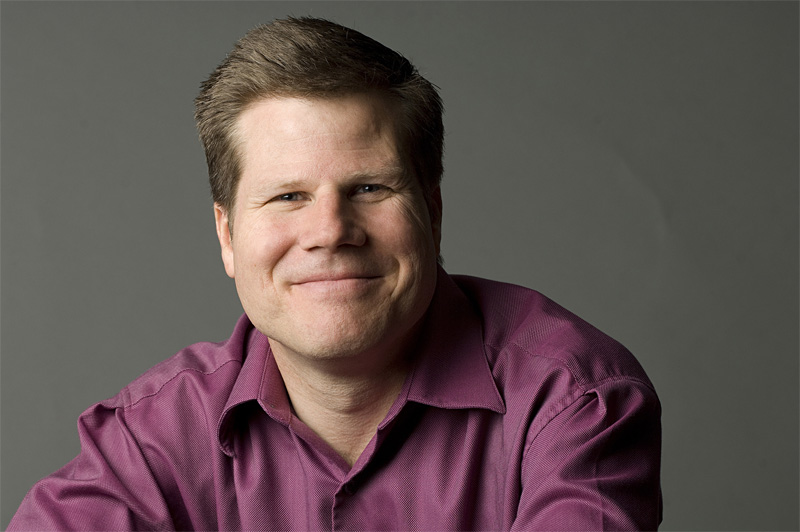It would be a mistake to think the Oregon Shakespeare Festival in Ashland only performs plays by Shakespeare. Sometimes it also puts on shows about Shakespeare.
At this year’s festival, the most critically and popularly raved-about production was the premiere of a political thriller set in Shakespeare’s time, Equivocation, which ran for six months. The Rep’s now bringing the show to Seattle with the original cast and director. After a touring Broadway production of The 39 Steps, it’s the second prepackaged import the theater’s showcased this year.
Equivocation imagines the chain of events that might have occurred had Robert Cecil, prime minister to King James I, commissioned Shakespeare to write a play about the Gunpowder Plot of 1605 against the king. Initially, Shakespeare (known as “Shag” in this play), approaches the gig as he had his previous history plays, which is to say as mercenary pen-for-hire. But as he discovers the extent to which “the official story” fed him by Cecil unfairly demonizes Catholics and justifies state policies of torture and persecution, he becomes morally conflicted and looks for a way to both please his patrons—so that they don’t kill him—and do the least possible damage to the scandal’s scapegoats.
Sound like any recent ethical dilemmas in the political realm? It’s meant to. The use of art’s influence over hearts and minds to bolster political ends is the real subject here. The word “equivocation” refers to the Church-sanctioned practice employed by Catholics under hostile interrogation to avoid answering questions that would condemn them to death. But it also refers to the kind of “creative truthmaking” that Shakespeare might have had to do in order to survive, entertain, and keep thousands of deaths off his conscience.
The playwright, Bill Cain, is a 62-year-old Jesuit priest, former schoolteacher, and former director of the Boston Shakespeare Company.
Director Bill Rauch has been artistic director at OSF since 2007, but is perhaps best known for his 20 years with L.A.’s Cornerstone Theater Company, which he co-founded with Alison Carey to take drama out of institutional theaters and into non-traditional community venues. The exuberant director recently sat down for a chat at Caffé Zingaro next door to the Rep.
SW: How did you first encounter Equivocation?
[It was] actually thanks to a Seattle resident, Jack Bentz [playwright and founding artistic director of Yakima’s Deus X Machina Theater], who is a mutual friend of mine and Bill Cain’s. He sent me the play and said “You’ve got to read this.” I knew Bill Cain from years before, but we hadn’t been in touch recently. I read the play and it just knocked my socks off.
Did the material change from that version to the version we’re going to see?
The spirit of the play, the courage of the play, the heart and soul of the play have remained unchanged from the first draft I read. But it’s changed a lot in terms of how that spirit and blood-and-guts of the play get communicated to the audience. Bill Cain did rewrites right through our opening, beyond our opening, and this version in Seattle actually reflects some script changes from what we closed in Ashland.
Is there anything in the play that particularly resonated with your own life?
The fact that the play is largely about a theater company, of course, hugely resonated with me, and the relationship between art and politics…the responsibilities and struggles we have as artists. My husband and I have two young kids and, well, you’ll see, there’s a lot about being a parent that runs through the play. It got me in a lot of ways.
Is theater in general an enterprise of equivocation, if we see equivocation as finding alternate truths?
We think of equivocation as a negative. If someone’s equivocating, they’re not being straightforward. But in Bill Cain’s world, equivocation is a positive way to tell the truth in difficult times. I’m paraphrasing, but one of the lines in the play is “If a dishonest man has formed a question, there can be no honest answer.” So how do you answer a dishonest question, a question that is there to trap you?
In the Ashland material there was a big thread that ran through our whole season about lying in order to tell the truth. The other play I directed was The Music Man, and you know Harold Hill, the con man, there to rip everyone off, and yet the town is transformed through his con—lives are changed, people find love and find hope through his con, and their lives improve. So that was the theme of the season, the slippery relationship between truth and lies. That’s absolutely one of the things that moved me about this play.








